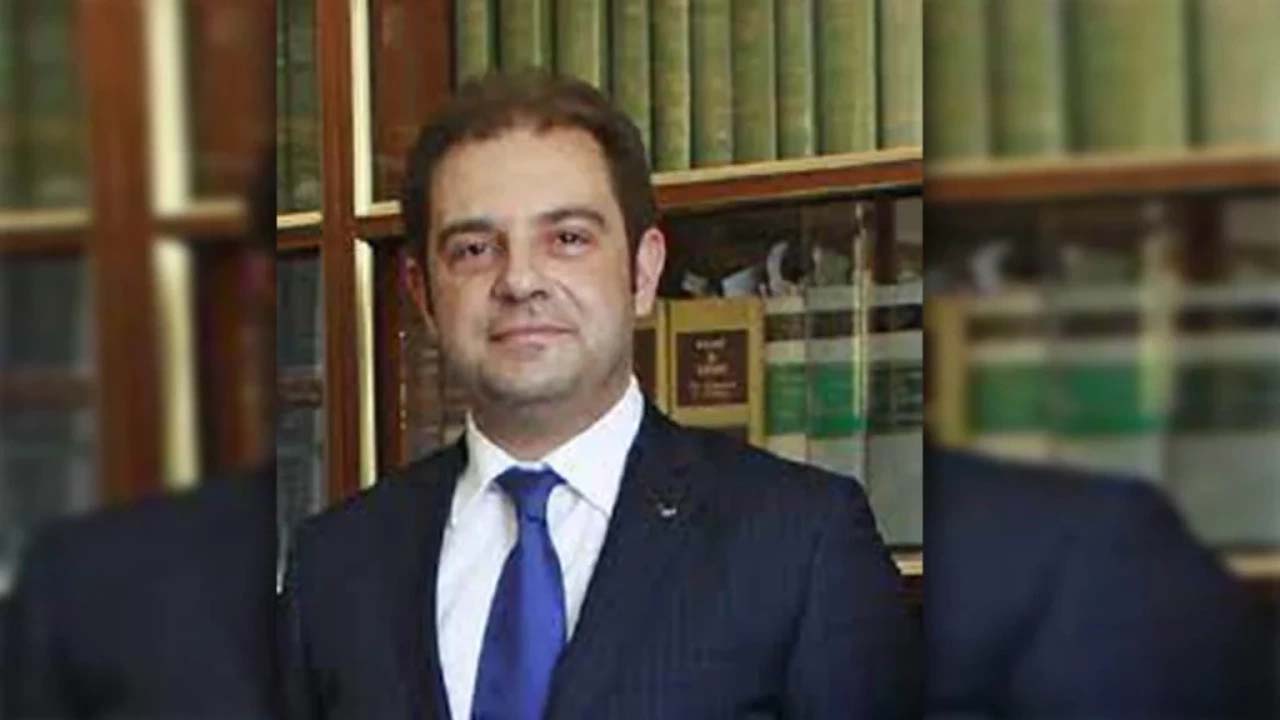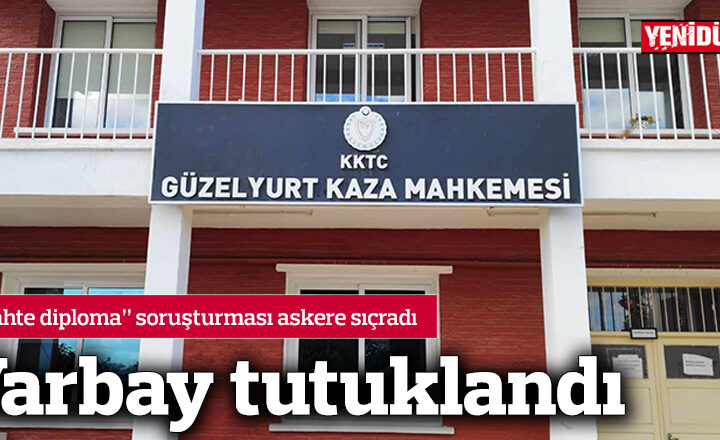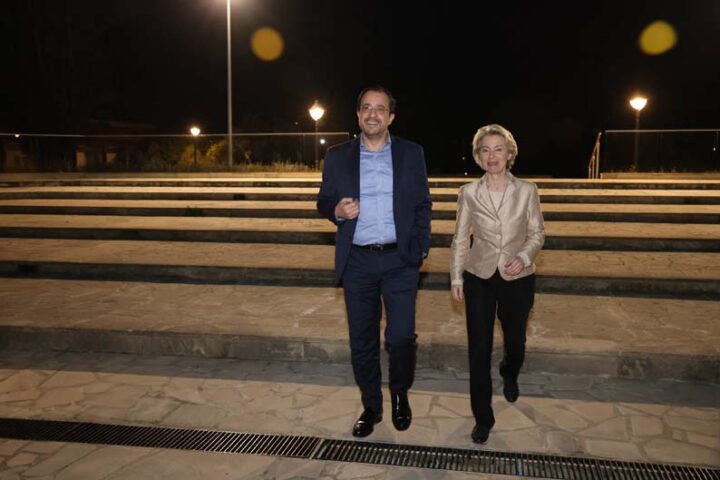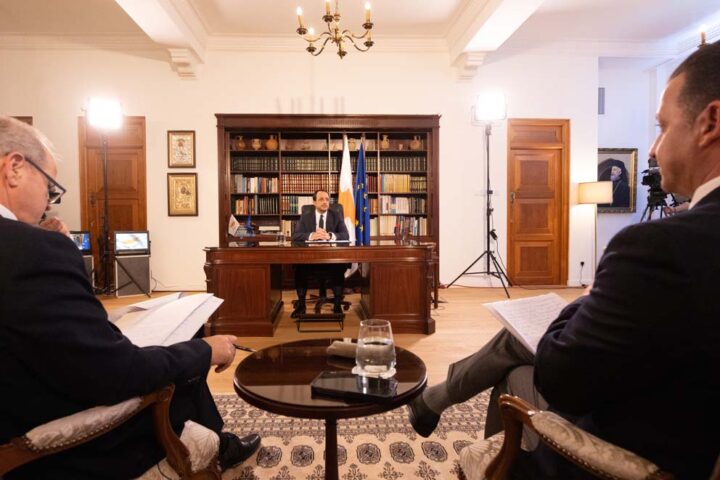Cyprus officials justified Thursday’s decision to suspend the prosecution of Turkish Cypriot lawyer Akan Kursat charged with embezzlement of Greek Cypriot-owned properties in the occupied north 20 years ago, saying on Friday this will not affect future cases.
The case collapsed when the authorities learned on February 19 that the primary prosecution witness, a Briton, had died. Following this development, the Attorney General decided to suspend prosecution and Kursat was set free.
He and his wife, deputy speaker of the Turkish Cypriot assembly Fazilet Ozdenefe and a deputy for the left-wing Turkish Republic Party (CTP), were on holiday in Rome when Kursat was apprehended at his hotel on an outstanding international arrest warrant.
He was held by Italian authorities pending his extradition, to which he consented on February 1. He arrived in Cyprus on February 8, accompanied by Republic officers, and appeared in Nicosia District Court the following morning to face charges and was released on bail, to appear in court again at the end of the month.
He faced a total of 20 charges including conspiracy to commit a felony, conspiracy to commit a misdemeanor, misappropriation of property by false representations, illegal possession and use of land registered to another, attempt to embezzle property by false representations, and fraud in the sale of property.
If found guilty, he would have faced imprisonment of up to seven years.
When the trial began on Thursday, February 29, the representative of the prosecuting authority, Maro Charalambous, told the court that the decision to suspend the criminal prosecution was taken, since the British key prosecution witness in this case had died.
Charalambous read to the court a statement from the Attorney General, citing the facts and as she said, the key testimony implicating Kursat in the sale of illegal property in the occupied north was taken in 2006 from a British man who bought a house on Greek Cypriot-owned land, on the basis of which the criminal prosecution was filed against the Turkish Cypriot lawyer and other persons.
Responding to criticism, Attorney General Yiorgos Savvides said, “the Legal Service assessed the available testimony and as is normal practice reported to the court in detail the reasons that led to the decision to suspend the criminal prosecution.”
Foreign Minister Constantinos Kombos said on Friday that the decision in the Kursat case does not affect the future handling of matters of property embezzlement and occupation in the north by the Republic of Cyprus.
Ongoing process
Speaking upon his arrival at the Nicosia old municipality for an event marking the 60th anniversary of the establishment of the UN peacekeeping force, UNFICYP, Kombos added that this is an ongoing process and that the President will be informed about the next steps in the implementation of the plan that the government and the Legal Service have prepared for the issue of usurpation of property in the occupied territories.
Asked if this could create a precedent for future cases, Kombos said that the announcement of the suspension and the justification of the Legal Service speaks for itself, describing the reasons for the decision as “clear”.
The Legal Services’ Maro Charalambous added that the arrest warrant had been issued in 2007, based on the British buyer’s testimony, and a European arrest warrant had been exercised.
On December 30, 2023, the Cypriot authorities were informed by the Italian authorities that Akan Kursat had been arrested in Rome, he was transferred to Cyprus on February 8 and the next day, on the 9th, he was charged.
Akan Kursat was quoted by the Cyprus News Agency as saying that he never doubted, “that justice would be served. I thank the Cypriot authorities and especially the Attorney General’s office for approaching the case with common sense,” he said.
His lawyer, Hasan Esendagli, said that “justice was served”.
“We felt it was basically an unfair case,” he said, adding that the assessment by the Attorney General’s office that he cannot prove this case and its suspension means the “removal of being held hostage that Akan Kursat suffered all this time.
“Unfortunately, the process that the Turkish Cypriot lawyer suffered in Italy under poor conditions is there and whatever he and his family endured. But today we are happy.”
Asked if Kursat will file charges against his apprehension in Italy, Esendagli said he had not discussed the matter with his client.
As regards the impact on property cases, the Turkish Cypriot layer said that the property issue is one of the most difficult aspects of the Cyprus problem.
“The Cyprus issue is a problem that has divided our country in two and is holding both Turkish and Greek Cypriots as hostage,” he said, claiming that he believes that those who have suffered the greatest burden from a non-solution since 1974 is the Turkish Cypriot community.
Given this situation, Esendagli added, he considers it “catastrophically wrong” for the Republic of Cyprus to proceed with criminal prosecutions and issue European arrest warrants, taking people to court.
“By prosecuting Turkish Cypriots, especially Turkish Cypriot citizens of the Republic of Cyprus, you cannot solve the issue of the rights of the Turkish Cypriot community or of the Republic of Cyprus. This is wrong, it is against human rights, it is not connected to the realities of Cyprus, it does not contribute to the solution of Cyprus, it will not help”, he stated.
According to Esendagli, this could impact the relations of trust between the two communities and he expressed “the hope and conviction” that “such a case will not be repeated”.
Asked if the outcome of this case will have an impact on public opinion among Greek Cypriots, who are sensitive about property and if he would like to send a message about this case, Esendagli said that he does not consider it a negative decision as to the property rights of Greek Cypriots.
He said that in the “north” there is the “property commission”, which is accepted by the ECHR as an internal legal instrument, and he said that in order to make this commission more effective, the Turkish Cypriot Bar Association has created its own committee.
Thursday’s decision, he concluded, “does not concern the violation of the property rights of the Greek Cypriots, but it concerns the release of a Turkish Cypriot lawyer from the charges he was facing and it is “a fair decision”.
Denied all charges
Appearing in court on February 9, Kursat denied all charges of embezzlement of Greek Cypriot-owned properties in the occupied north 20 years ago and was released on bail.
His family law firm is known for representing British drug baron Gary Robb, who was behind a multi-million development that swindled buyers from Britain.
Cypriot authorities requested his extradition from Italy, marking the first time a Turkish Cypriot had been arrested abroad for such a case.
The allegations suggested that the case was related to the misappropriation of properties in the northern part of Cyprus, particularly in the Klepini area near Kyrenia.
Kursat’s arrest had the potential of opening a Pandora’s Box, as he initially said he would not be safe if held in the Nicosia central prisons, where a Turkish Cypriot inmate was killed two years ago.
Politicians in the occupied north claimed this was a witch hunt and aimed at undermining the UN-sponsored peace talks between the two communities.
It also turned the spotlight on the weakness of the government machine, that reportedly renewed Kursat’s Republic of Cyprus passport, despite an arrest warrant pending for nearly two decades, using which he allegedly travelled to Italy.
European arrest warrants were previously issued against Kursat and his father, Talat Kursat, for their involvement in the sale of Greek Cypriot properties during 2004-2005.
British con man Gary Robb’s company allegedly attempted to illegally sell property belonging to Greek Cypriots to foreigners, resulting in legal action by investors who claimed extortion through misrepresentation.
Drug trafficking
Robb, a convicted British drug dealer, had started building luxury villas on Greek Cypriot land in Kyrenia in 2004-2005, but was forced to abandon his projects after he faced legal troubles and imprisonment in the UK for drugs trafficking.
He was building some 335 luxury villas as part of the Amaranta Valley Estate on Greek Cypriot-owned land.
British police estimated at the time that approximately 400 Britons incurred losses exceeding €40 mln in deals with AGA Development.
It is alleged that Robb received weekly sums of £5,000 to £10,000 from the drug trade in England, and he reportedly directed this money to the northern part of Cyprus.
He was sentenced to five years by a UK court, with Cyprus requesting his extradition in 2011, following the issuance of a European arrest warrant.
A court in the government-controlled areas sentenced Robb to 11 months imprisonment, but after that he was extradited back to the UK.
Earlier, Britons William George and Eleanor Barker Rene Alcock, who purchased a villa in Klepini in 2005 from AGA Developments Ltd, lodged a complaint against Talat Kursat in Turkish Cypriot courts, leading to a decision on December 24, 2018.
The plaintiffs contended that the funds they had sent to Talat Kursat, the lawyer representing the company and Robb, for their mansion’s purchase, were never transferred to them.
Instead, Kursat allegedly retained the money in his personal account. Despite the plaintiffs’ persistent appeals, the sum of £64,755 was never recovered.
The court had decided that Talat Kursat misappropriated the money or transferred it to his own bank account.
Cross-border mafia
Meanwhile, a prominent Turkish Cypriot politician claimed that the mafia on both sides of the divide in Cyprus seem to be cooperating to sell off Greek Cypriot properties in the Turkish occupied north to foreigners.
People’s Party leader, and former Cyprus problem negotiator, Kudret Ozersay, highlighted in a recent interview the surge in property sales to foreigners in the north, suggested that a legal loophole allows Turkish Cypriot lawyers to act as intermediaries, facilitating unrestricted property acquisitions by foreign individuals.
He pointed to a specific legal measure for Turkish Cypriots, who receive Greek Cypriot land as compensation for losses incurred in the state-controlled areas after the Turkish invasion and division in 1974.
Ozersay also expressed concern about practices in state-controlled areas, where Turkish Cypriots are denied access to their properties due to the custodianship law enacted by the Republic after 1974.
He emphasised the challenges faced by his family in accessing their property in the south.
“My family has property in the south, but cannot enjoy it because of the custodianship law on Turkish Cypriot properties, which says until the solution of the Cyprus problem it is basically impossible for me to get that land, unless I move to the south,” he said.
Ozersay also questioned the allocation of Turkish Cypriot properties managed by the Turkish Cypriot Property Management Authority in the south, noting instances where they were given to Greek Cypriot non-refugees, sublet, or utilised by the state for infrastructure development.
Addressing potential solutions, Ozersay pointed to the existence of the Immovable Property Commission (IPC) in the north handing out compensations to Greek Cypriots for the loss of their properties.
As he argued, despite its challenges, it is recognised by the European Court of Human Rights as an effective domestic remedy.
The Cyprus Bar Association has also initiated investigations into certain members and a company allegedly involved in property transactions in the north, including those connected to Akan Kursat.










